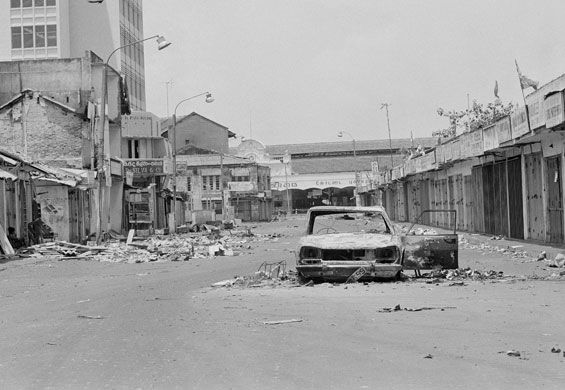
In a statement marking 40 years since the 1983 anti-Tamil pogrom, advocacy organisation People for Equality and Relief in Lanka (PEARL) highlighted Sri Lanka's culture of impunity and the need for an independent, international accountability mechanism.
Between 23rd and 30th July 1983, thousands of Tamils were killed by Sinhala mobs backed by the then UNP government and state forces.
Armed with electoral rolls, Sinhala mobs targeted Tamil homes and businesses, looting and ransacking property. Driven from their homes, particularly in Colombo, over 3000 Tamils were massacred, whilst thousands more were effectively deported by the state to the North-East.
"The events of Black July were not isolated acts of violence; they were systematic and intentional, nurtured by a rampant Sinhala-Buddhist nationalist ideology that has become entrenched in all state structures. During the riots, the government provided Sinhalese mobs with voter lists and addresses of Tamil homes and businesses, and even transported them around Colombo in government-owned vehicles," PEARL wrote.
Read more on Black July here: Remembering Black July 40 years on.
"Black July not only foreshadowed the tragedy of the 26-year-long armed conflict, but also triggered the largest exodus of Tamils from their homeland. The scars of Black July and its far-reaching consequences continue to echo within the Tamil community and its collective memory," the organisation added.
For decades, Sri Lanka has established multiple commissions to 'investigate' massacres perpetrated against Tamils but none have amounted to any meaningful accountability. This year, Sri Lanka announced that it will establish a Truth and Reconciliation Commission which Tamil civil society have rejected as they lack confidence in domestic accountability mechanisms.
PEARL added that "Tamil people have rightly rejected the latest proposed commission" and "have no reason to trust a government that continues to make empty promises on reconciliation without true justice and accountability." Instead, PEARL stated that the international community must support the Tamil demand for "an independent, international mechanism that ensures impartial investigations and prosecutions."
Full statement reproduced below:
40 Years of Impunity: Remembering Black July
Today, as we mark the solemn occasion of the 40th anniversary of Black July, PEARL stands in solidarity with Tamils worldwide to honor the memory of the victims and survivors and to reflect upon the enduring impact of this genocide committed against the Tamil people.
Between July 23 and July 30, 1983, state-backed Sinhalese mobs killed 3,000 Tamils, and destroyed 5,000 Tamil businesses and 18,000 Tamil homes. In just over a week, 90,000 to 150,000 Tamils were displaced.
The events of Black July were not isolated acts of violence; they were systematic and intentional, nurtured by a rampant Sinhala-Buddhist nationalist ideology that has become entrenched in all state structures. During the riots, the government provided Sinhalese mobs with voter lists and addresses of Tamil homes and businesses, and even transported them around Colombo in government-owned vehicles. Three days into the violence, then-president J.R. Jayewardene was quoted as saying: “The more you put pressure there (in the north) the happier they (the Sinhalese) will be here... Really, if I starve the Tamils out, the Sinhalese will be happy.” Black July not only foreshadowed the tragedy of the 26-year-long armed conflict, but also triggered the largest exodus of Tamils from their homeland. The scars of Black July and its far-reaching consequences continue to echo within the Tamil community and its collective memory.
Four decades later, impunity for Black July persists. No individual, nor the Sri Lankan state, has been held responsible for the atrocities committed during Black July. This lack of accountability has emboldened the Sri Lankan government, allowing it to perpetrate further human rights violations, including the Mullivaikkal Genocide of 2009, from which there are still 70,000 to 169,796 Tamils left unaccounted for, either forcibly disappeared or killed.
This year, the government proposed a Truth and Reconciliation Commission to address past atrocities and foster healing among communities. Several similar commissions were created since Black July, but they were ineffectual and did not provide redress or accountability. In the context of these past failed commissions, which lacked independence, impartiality, and failed to deliver meaningful justice, Tamil people have rightly rejected the latest proposed commission.
Tamils have no reason to trust a government that continues to make empty promises on reconciliation without true justice and accountability. The international community must support the demand of civil society, Tamil diaspora, and legislators for the recognition of the Tamil Genocide. It must also support the victim-survivor community in their rejection of the Truth and Reconciliation Commission and their demand for an independent, international mechanism that ensures impartial investigations and prosecutions. Amidst this history of grief and loss, PEARL continues to stand alongside fellow Tamils in their unwavering pursuit of justice, accountability, and self-determination.


